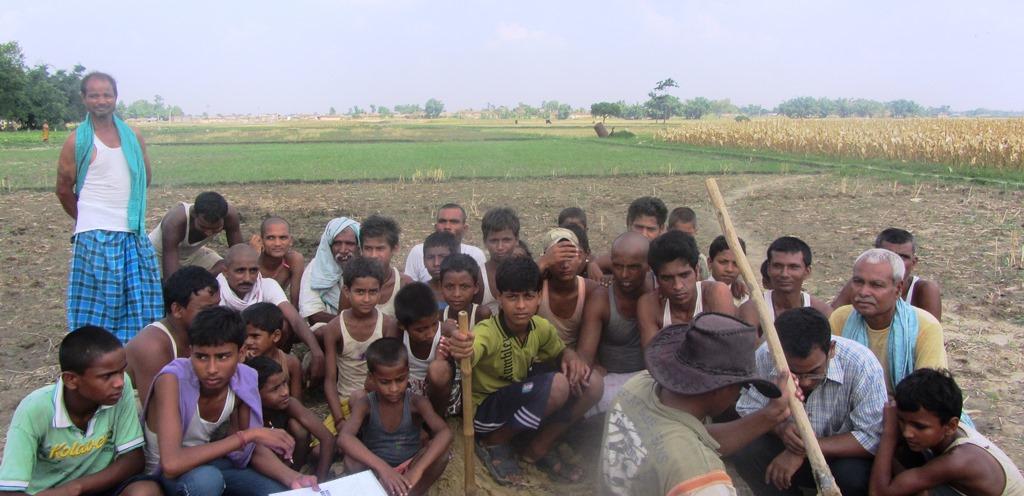-
About
- Our Work
- Get Involved
- Stay Updated
Respect farmers
In the episode Agriculture entrepreneurs a current affairs television show of Sajha Sawal, Devi Prasad Timilsina, a beekeeping farmer from Parbat district, Nepal shared I am earning $10,000 USD per year but I am not getting workers to support my activities even if I am trying to provide good salary. My elder son has gone in Gulf country to earn $1,000- 1,500 USD per year. He added, farming is dirty and the present youth feels agriculture, after all, is the real sectors to which societies poorest belong.
This is just one testimonial about the increasing trend of youths quitting the sector and going abroad for employment. Ask a young person what they wish for their future, and obviously very few will mention agriculture in their response. Youth are not showing interest towards the agriculture sector mainly due to absence of glamour.
Because of unavailability of other employment opportunities, low investment capacity and lack of infrastructure and market opportunities, majority of farmers are adopting traditional technology. There is the problem of low returns from the sector in comparison to the cost and labor employed on the one hand while land are starting to remain barren in lack of work force as the youths are going abroad to earn quick bucks on the other hand. Getting agriculture loans and services are still very difficulties to the farmers.
I have been hearing that agriculture is the governments priority since I was a child, however, farmers and farming never got priority on ground level. Allocation of the least amount of budget (2-4 percent of whole budget) is recognized not only as irrelevant to meet the sectorial development but also problematic to sustain farmers livelihood. Actual results are not visible though slogans of modernizing and commercializing agriculture have been heard for decades. Why arent we getting benefits from our products in regional and international market when we have signed as member of world trade organization decades ago?
Farming is mainly done by illiterate farmers and it has been associated significantly with risk. When we (consumer) go in market; we usually make a bargain in agriculture commodities with farmers to get the cheapest price. Even sometimes, we refused to buy agriculture commodities which are brought from rural areas due to loss of consumer appealing. Most of the time, these are not associated with non-healthy products but they are more lacking with value addition concept like cleaning, grading, packaging. Consumers are compelled to pay higher to the products but farmers are not getting in the same ratio what consumers are paying and thus middlemen (retailers) are taking benefits from the improper marketing mechanism.
However, in recent time there is some more attraction in farming. We have hundreds of youth who are able to practice modern agriculture; several youths are back in their home country with relevant knowledge and eagerness to invest in different areas of agriculture sector. They are more attracted in agricultural enterprises which fetch better consumer demands. Governmental agriculture offices, I/NGO and other stakeholders are encouraging farmers by providing technical skills, even up to planting materials and developing marketing channels.
Being technological late adopter from developing country means, we can replicate different successful development models from global to national and local level based on our scenario. Similarly our generation can help introduce new technologies whilst also learning from traditional methods, holding the potential to offer the perfect fusion of new and traditional solutions to some of the biggest challenges. Potential uses of ICT for rural development can help deter young people away from stereotypes of traditional farming and help to change their perceptions on agriculture, by making it an exciting and innovative industry. Recently 204 Nepalese youths has gone for advanced agriculture training in Israel with major objective to empower small holder farmers in Nepal.
In the recent time, central bank has formulated policy for commercial and development bank that they should invest 12 percent of total in agriculture. The recently concluded 6th NRN Global Conference has committed to support modern agriculture and commercialization. By the 2014, the government is going to implement Agriculture Development Strategy (ADS) with concept of agricultural transformation. The combine efforts of government, non-government organizations, private sectors and other allied bodies; they can attract more youth and can help to the more farmers to make agriculture as an admirable sector in Nepal.
Farmers, they grow our crops; manage our land and safe guard biodiversity for our future. We need to gear up agriculture from our current level; we need to respect farmers who are currently working in agriculture, and we need to reward them in society and whole nation. At their center is farming, we should be proud of farming and share our respect to them.
Tags:About the author
Related Posts
Comments
No comments made yet. Be the first to submit a commentBy accepting you will be accessing a service provided by a third-party external to https://ypard.net/
Get in touch
Email: [email protected]
YPARD Global Coordination UnitHosted by AGRIDEA and the Czech University of Life Sciences Prague
Lausanne, Switzerland and Prague, Czech Republic - Our Work


